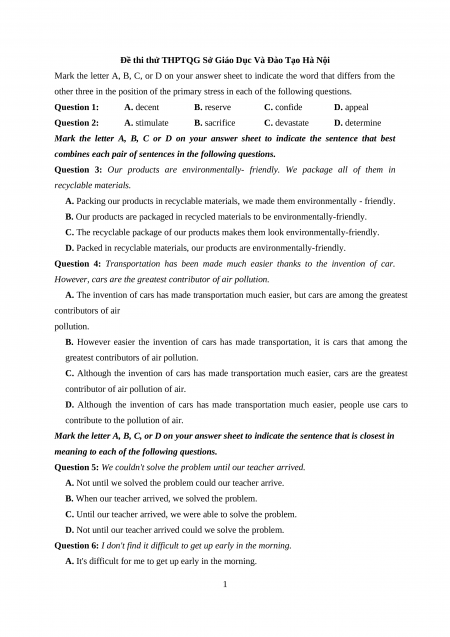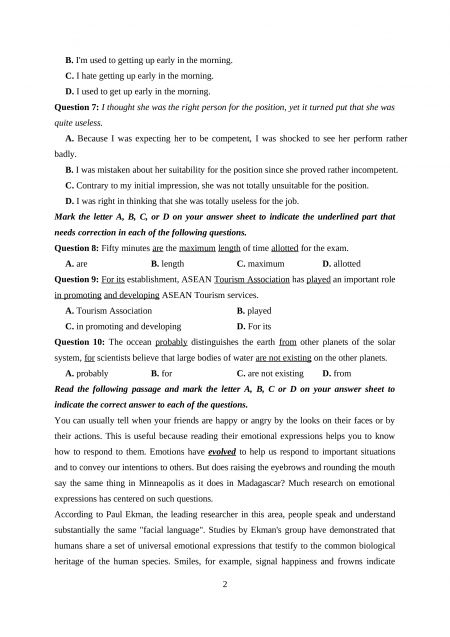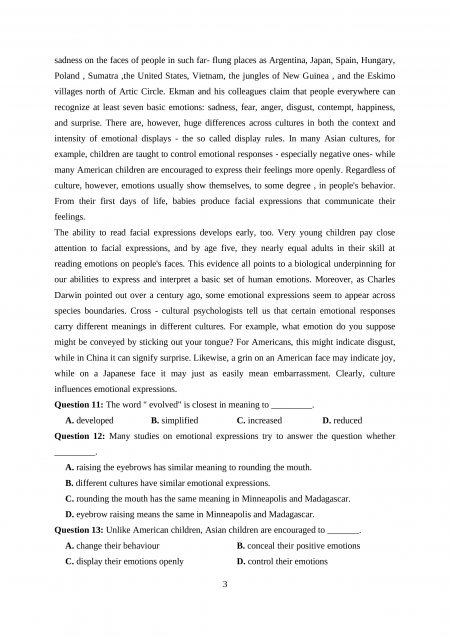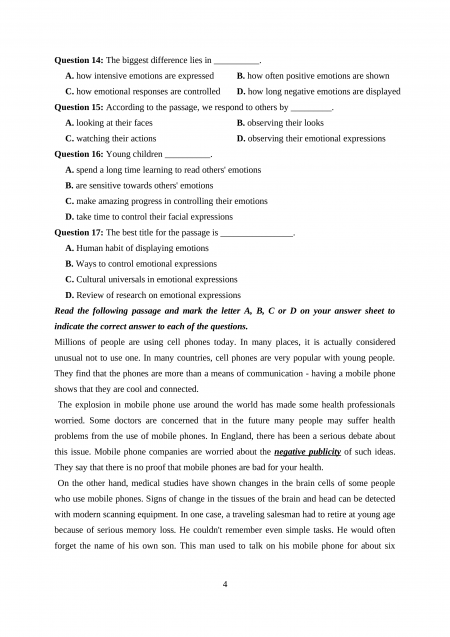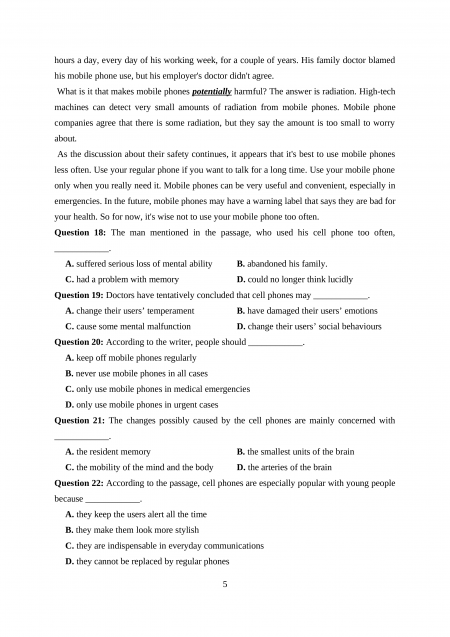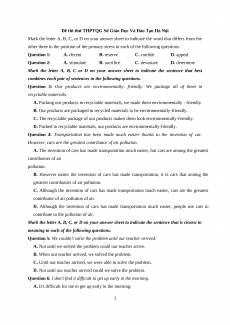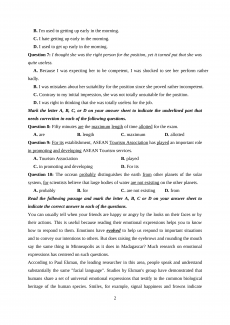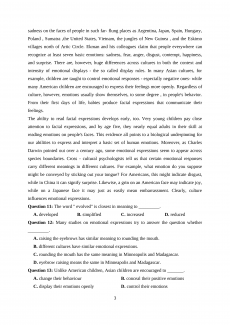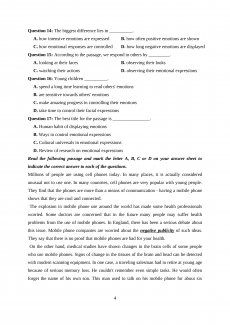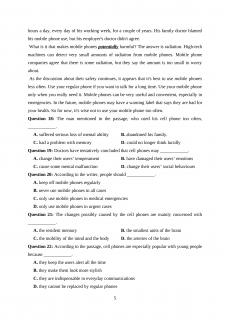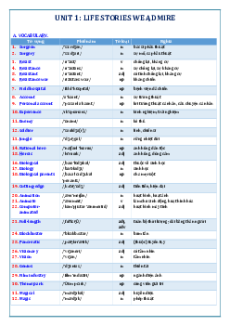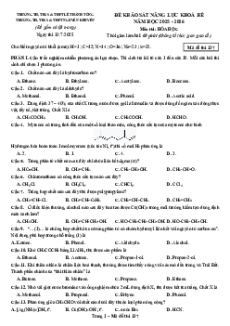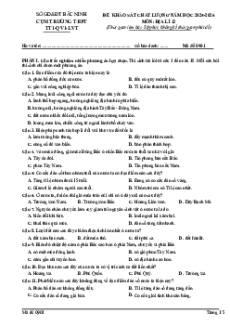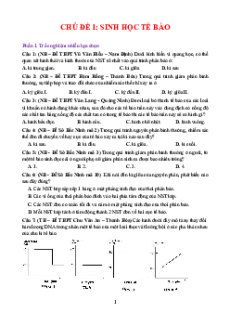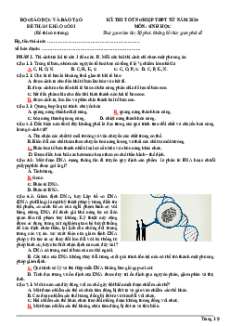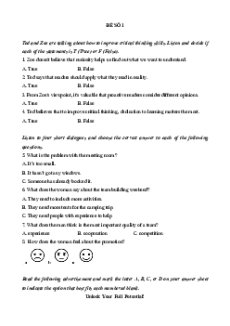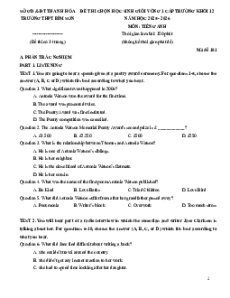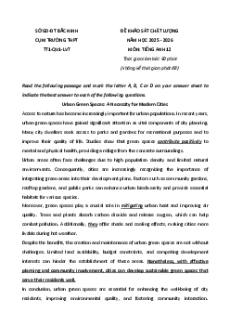Đề thi thử THPTQG Sở Giáo Dục Và Đào Tạo Hà Nội
Mark the letter A, B, C, or D on your answer sheet to indicate the word that differs from the
other three in the position of the primary stress in each of the following questions. Question 1: A. decent B. reserve C. confide D. appeal Question 2: A. stimulate B. sacrifice C. devastate D. determine
Mark the letter A, B, C or D on your answer sheet to indicate the sentence that best
combines each pair of sentences in the following questions.
Question 3: Our products are environmentally- friendly. We package all of them in recyclable materials.
A. Packing our products in recyclable materials, we made them environmentally - friendly.
B. Our products are packaged in recycled materials to be environmentally-friendly.
C. The recyclable package of our products makes them look environmentally-friendly.
D. Packed in recyclable materials, our products are environmentally-friendly.
Question 4: Transportation has been made much easier thanks to the invention of car.
However, cars are the greatest contributor of air pollution.
A. The invention of cars has made transportation much easier, but cars are among the greatest contributors of air pollution.
B. However easier the invention of cars has made transportation, it is cars that among the
greatest contributors of air pollution.
C. Although the invention of cars has made transportation much easier, cars are the greatest
contributor of air pollution of air.
D. Although the invention of cars has made transportation much easier, people use cars to
contribute to the pollution of air.
Mark the letter A, B, C, or D on your answer sheet to indicate the sentence that is closest in
meaning to each of the following questions.
Question 5: We couldn't solve the problem until our teacher arrived.
A. Not until we solved the problem could our teacher arrive.
B. When our teacher arrived, we solved the problem.
C. Until our teacher arrived, we were able to solve the problem.
D. Not until our teacher arrived could we solve the problem.
Question 6: I don't find it difficult to get up early in the morning.
A. It's difficult for me to get up early in the morning. 1
B. I'm used to getting up early in the morning.
C. I hate getting up early in the morning.
D. I used to get up early in the morning.
Question 7: I thought she was the right person for the position, yet it turned put that she was quite useless.
A. Because I was expecting her to be competent, I was shocked to see her perform rather badly.
B. I was mistaken about her suitability for the position since she proved rather incompetent.
C. Contrary to my initial impression, she was not totally unsuitable for the position.
D. I was right in thinking that she was totally useless for the job.
Mark the letter A, B, C, or D on your answer sheet to indicate the underlined part that
needs correction in each of the following questions.
Question 8: Fifty minutes are the maximum length of time allotted for the exam. A. are B. length C. maximum D. allotted
Question 9: For its establishment, ASEAN Tourism Association has played an important role
in promoting and developing ASEAN Tourism services. A. Tourism Association B. played
C. in promoting and developing D. For its
Question 10: The occean probably distinguishes the earth from other planets of the solar
system, for scientists believe that large bodies of water are not existing on the other planets. A. probably B. for C. are not existing D. from
Read the following passage and mark the letter A, B, C or D on your answer sheet to
indicate the correct answer to each of the questions.
You can usually tell when your friends are happy or angry by the looks on their faces or by
their actions. This is useful because reading their emotional expressions helps you to know
how to respond to them. Emotions have evolved to help us respond to important situations
and to convey our intentions to others. But does raising the eyebrows and rounding the mouth
say the same thing in Minneapolis as it does in Madagascar? Much research on emotional
expressions has centered on such questions.
According to Paul Ekman, the leading researcher in this area, people speak and understand
substantially the same "facial language". Studies by Ekman's group have demonstrated that
humans share a set of universal emotional expressions that testify to the common biological
heritage of the human species. Smiles, for example, signal happiness and frowns indicate 2
sadness on the faces of people in such far- flung places as Argentina, Japan, Spain, Hungary,
Poland , Sumatra ,the United States, Vietnam, the jungles of New Guinea , and the Eskimo
villages north of Artic Circle. Ekman and his colleagues claim that people everywhere can
recognize at least seven basic emotions: sadness, fear, anger, disgust, contempt, happiness,
and surprise. There are, however, huge differences across cultures in both the context and
intensity of emotional displays - the so called display rules. In many Asian cultures, for
example, children are taught to control emotional responses - especially negative ones- while
many American children are encouraged to express their feelings more openly. Regardless of
culture, however, emotions usually show themselves, to some degree , in people's behavior.
From their first days of life, babies produce facial expressions that communicate their feelings.
The ability to read facial expressions develops early, too. Very young children pay close
attention to facial expressions, and by age five, they nearly equal adults in their skill at
reading emotions on people's faces. This evidence all points to a biological underpinning for
our abilities to express and interpret a basic set of human emotions. Moreover, as Charles
Darwin pointed out over a century ago, some emotional expressions seem to appear across
species boundaries. Cross - cultural psychologists tell us that certain emotional responses
carry different meanings in different cultures. For example, what emotion do you suppose
might be conveyed by sticking out your tongue? For Americans, this might indicate disgust,
while in China it can signify surprise. Likewise, a grin on an American face may indicate joy,
while on a Japanese face it may just as easily mean embarrassment. Clearly, culture
influences emotional expressions.
Question 11: The word " evolved" is closest in meaning to _________. A. developed B. simplified C. increased D. reduced
Question 12: Many studies on emotional expressions try to answer the question whether _________.
A. raising the eyebrows has similar meaning to rounding the mouth.
B. different cultures have similar emotional expressions.
C. rounding the mouth has the same meaning in Minneapolis and Madagascar.
D. eyebrow raising means the same in Minneapolis and Madagascar.
Question 13: Unlike American children, Asian children are encouraged to _______.
A. change their behaviour
B. conceal their positive emotions
C. display their emotions openly
D. control their emotions 3
Question 14: The biggest difference lies in __________.
A. how intensive emotions are expressed
B. how often positive emotions are shown
C. how emotional responses are controlled
D. how long negative emotions are displayed
Question 15: According to the passage, we respond to others by _________.
A. looking at their faces
B. observing their looks
C. watching their actions
D. observing their emotional expressions
Question 16: Young children __________.
A. spend a long time learning to read others' emotions
B. are sensitive towards others' emotions
C. make amazing progress in controlling their emotions
D. take time to control their facial expressions
Question 17: The best title for the passage is ________________.
A. Human habit of displaying emotions
B. Ways to control emotional expressions
C. Cultural universals in emotional expressions
D. Review of research on emotional expressions
Read the following passage and mark the letter A, B, C or D on your answer sheet to
indicate the correct answer to each of the questions.
Millions of people are using cell phones today. In many places, it is actually considered
unusual not to use one. In many countries, cell phones are very popular with young people.
They find that the phones are more than a means of communication - having a mobile phone
shows that they are cool and connected.
The explosion in mobile phone use around the world has made some health professionals
worried. Some doctors are concerned that in the future many people may suffer health
problems from the use of mobile phones. In England, there has been a serious debate about
this issue. Mobile phone companies are worried about the negative publicity of such ideas.
They say that there is no proof that mobile phones are bad for your health.
On the other hand, medical studies have shown changes in the brain cells of some people
who use mobile phones. Signs of change in the tissues of the brain and head can be detected
with modern scanning equipment. In one case, a traveling salesman had to retire at young age
because of serious memory loss. He couldn't remember even simple tasks. He would often
forget the name of his own son. This man used to talk on his mobile phone for about six 4
Bộ 93 Đề thi thử Tiếng Anh THPT Quốc gia năm 2018 chọn lọc từ các trường
CÁCH MUA:
- B1: Gửi phí vào TK:
1133836868- CT TNHH DAU TU VA DV GD VIETJACK - Ngân hàng MB (QR) - B2: Nhắn tin tới Zalo VietJack Official ( nhấn vào đây ) để xác nhận thanh toán và tải tài liệu - giáo án
Liên hệ ngay Hotline hỗ trợ: 084 283 45 85
Đề thi được cập nhật liên tục trong gói này từ nay đến hết tháng 6/2023. Chúng tôi đảm bảo đủ số lượng đề đã cam kết hoặc có thể nhiều hơn, tất cả có BẢN WORD, LỜI GIẢI CHI TIẾT và tải về dễ dàng.
Để tải tài liệu gốc về máy bạn click vào nút Tải Xuống ở trên!
Thuộc bộ (mua theo bộ để tiết kiệm hơn):
- Bộ 93 Đề thi thử THPT Quốc gia Tiếng Anh năm 2018 chọn lọc từ các trường bản word có lời giải chi tiết:
+ Đề thi thử Tiếng Anh THPT Quốc gia năm 2018 trường THPT Chuyên Bắc Ninh;
+ Đề thi thử Tiếng Anh THPT Quốc gia năm 2018 trường THPT Chuyên Thái Bình;
+ Đề thi thử Tiếng Anh THPT Quốc gia năm 2018 trường THPT Chuyên Lam Sơn;
+ Đề thi thử Tiếng Anh THPT Quốc gia năm 2018 trường THPT Chuyên Hà Giang;
+Đề thi thử Tiếng Anh THPT Quốc gia năm 2018 trường THPT Chuyên Biên Hòa.
……………………
- Mua trọn bộ sẽ tiết kiệm hơn tải lẻ 50%.
Đánh giá
4.6 / 5(1134 )Trọng Bình
Giúp ích cho tôi rất nhiều
Duy Trần
Rất thích tài liệu bên VJ soạn (bám sát chương trình dạy)
TÀI LIỆU BỘ BÁN CHẠY MÔN Tiếng Anh
Xem thêmTÀI LIỆU BỘ BÁN CHẠY Tốt nghiệp THPT
Xem thêmTài liệu bộ mới nhất





